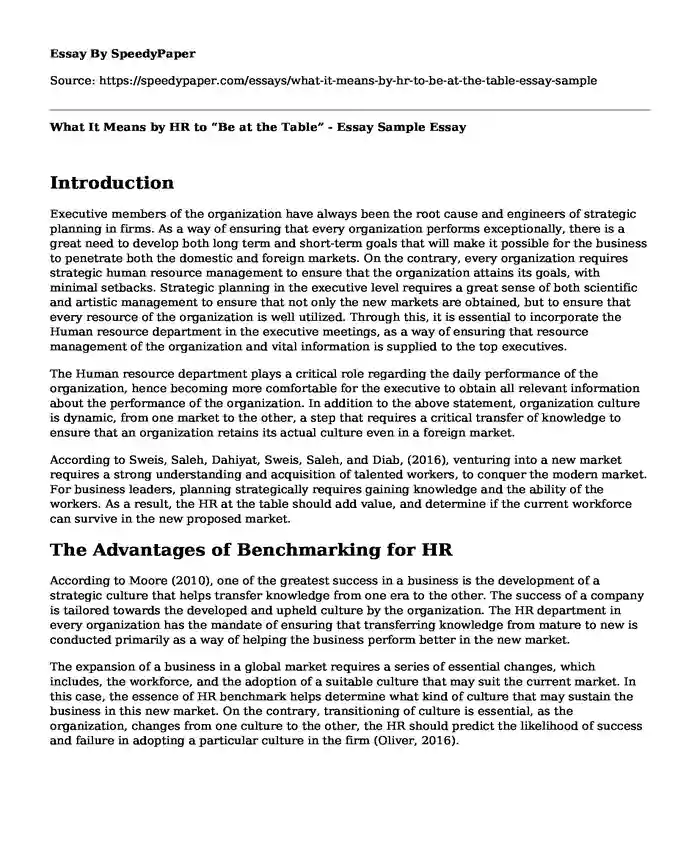
| Type of paper: | Article review |
| Categories: | Human resources |
| Pages: | 3 |
| Wordcount: | 743 words |
Introduction
Executive members of the organization have always been the root cause and engineers of strategic planning in firms. As a way of ensuring that every organization performs exceptionally, there is a great need to develop both long term and short-term goals that will make it possible for the business to penetrate both the domestic and foreign markets. On the contrary, every organization requires strategic human resource management to ensure that the organization attains its goals, with minimal setbacks. Strategic planning in the executive level requires a great sense of both scientific and artistic management to ensure that not only the new markets are obtained, but to ensure that every resource of the organization is well utilized. Through this, it is essential to incorporate the Human resource department in the executive meetings, as a way of ensuring that resource management of the organization and vital information is supplied to the top executives.
The Human resource department plays a critical role regarding the daily performance of the organization, hence becoming more comfortable for the executive to obtain all relevant information about the performance of the organization. In addition to the above statement, organization culture is dynamic, from one market to the other, a step that requires a critical transfer of knowledge to ensure that an organization retains its actual culture even in a foreign market.
According to Sweis, Saleh, Dahiyat, Sweis, Saleh, and Diab, (2016), venturing into a new market requires a strong understanding and acquisition of talented workers, to conquer the modern market. For business leaders, planning strategically requires gaining knowledge and the ability of the workers. As a result, the HR at the table should add value, and determine if the current workforce can survive in the new proposed market.
The Advantages of Benchmarking for HR
According to Moore (2010), one of the greatest success in a business is the development of a strategic culture that helps transfer knowledge from one era to the other. The success of a company is tailored towards the developed and upheld culture by the organization. The HR department in every organization has the mandate of ensuring that transferring knowledge from mature to new is conducted primarily as a way of helping the business perform better in the new market.
The expansion of a business in a global market requires a series of essential changes, which includes, the workforce, and the adoption of a suitable culture that may suit the current market. In this case, the essence of HR benchmark helps determine what kind of culture that may sustain the business in this new market. On the contrary, transitioning of culture is essential, as the organization, changes from one culture to the other, the HR should predict the likelihood of success and failure in adopting a particular culture in the firm (Oliver, 2016).
The Disadvantages of Benchmarking for HR
Despite the success and heavy influence of HR benchmarking to improve the performance of the organization, the HR adopts a culture that is fatal, leading to struggles of the organization. Not all cultures or new forms in the organization works as anticipated. Through this, benchmarking for the HR may be catastrophic, especially when advancing to the global market, proving it to be a colossal mistake.
Additionally, benchmarking results in adopting a new culture that seems to threaten the currently existing culture in the organization. Never the less, workers are profoundly affected, which results in poor performance in the organization.
Conclusion
In conclusion, HR being at the table plays a critical role in providing essential information that may not be available from other sources of the organization. In this case, the business leaders should take the initiative of incorporating HR members in there meeting to ensure that value is added in the final discussion. On the contrary, benchmarking for HR helps improve and inspire performance in the organization, through replacing outdated culture with a current trend. However, the downside of the HR benchmarking may prove to be fatal and slow productivity of the firm.
References
Moore, K. (2010). David Ulrich on Bringing HR to the Table. [video] Available at: https://www.youtube.com/watch?v=om-QOUNeWtM [Accessed 4 Feb. 2020].
Oliver, J. J. (2016). Benchmarking workforce productivity in the creative industries. Strategic HR Review. doi. 10.1108/SHR-10-2015-0082
Sweis, R. J., Saleh, F. I. M., Dahiyat, S. E., Sweis, N. J., Saleh, R. A., & Diab, H. (2016). Benchmarking of TQM practices in INGOs: a literature review. Benchmarking: An International Journal. Doi.10.1108/BIJ-02-2015-0013/full/html
Cite this page
What It Means by HR to "Be at the Table" - Essay Sample. (2023, Mar 29). Retrieved from https://speedypaper.net/essays/what-it-means-by-hr-to-be-at-the-table-essay-sample
Request Removal
If you are the original author of this essay and no longer wish to have it published on the SpeedyPaper website, please click below to request its removal:
- Reflective Essay Sample: Team Management
- Critical Thinking Skills and Organization Essay Sample
- Essay Sample: Mycobacterium Tuberculosis Research
- Essay Example on Tattoos on the Heart Organization
- Free Essay Example: Change Management in Community Policing
- Essay Sample on Artificial Wombs Technology
- Free Essay Example - The Sad Stories Behind The LeftOvers by Erin Whitney
Popular categories




